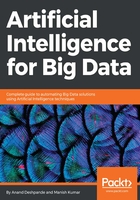
上QQ阅读APP看书,第一时间看更新
Ontology properties
At a high level, Ontologies should have the following properties to create a consistent view of the universe of data, information, and knowledge assets:
- The Ontologies should be complete so that all aspects of the entities are covered.
- The Ontologies should be unambiguous in order to avoid misinterpretation by people and software applications.
- The Ontologies should be consistent with the domain knowledge to which they are applicable. For example, Ontologies for medical science should adhere to the formally established terminologies and relationships in medical science.
- The Ontologies should be generic in order to be reused in different contexts.
- The Ontologies should be extensible in order to add new concepts and facilitate adherence to the new concepts, that emerge with growing knowledge in the domain.
- The Ontologies should be machine-readable and interoperable.
Here is an illustration to better explain properties of Ontologies:

The most important advantage of Ontological representation for real-world concepts and entities is that it facilitates the study of concepts independently of programming language, platforms, and communication protocols. This enables loose coupling, and at the same time, tight integration between the concepts, which enables the software development process to reuse the software and knowledge base as modular concepts.